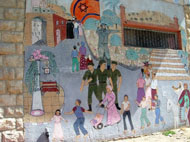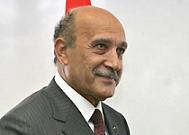After seven years of stalled negotiations between Israel and Palestine, one could possibly not presume that all problems would be solved by one summit, let alone a summit that had been penciled in just as the two old enemies had reconvened dialogue.
The summit in Annapolis is set to begin next Monday and the negotiating teams on both sides are still attempting to construct a joint document on “core” issues under significant pressure from the US and Arab states. The truth is that President Abbas and Prime Minister Olmert should push for the “core” issues they are able to openly discuss and implement with immediate effect – namely those raised in the Road Map. If they rush an agreement on all six “core” issues, the summit is headed for disagreement, exhausting debate, wasted words and failure. There are too many exterior forces presently preventing them from deliberating on such issues.
Just last week, the Knesset passed a motion to obstruct Olmert from compromising on Jerusalem; Commissioner-General of UNRWA Karen Abu Zayd, has stated that with the deficit of $86 million dollars forecasted for 2008, it would be an impossibility for them to accommodate any form of Palestinian refugee return; and top ranking Israeli officials, seemingly in support of an independent Palestinian state, have stipulated that Palestine, as a prerequisite, must recognize Israel as a Jewish state. Tzipi Livni declared that Palestinians “cannot have their cake and eat it” while Arab MK’s attest that this move would relegate 20% of the Israeli population to second class citizens. Uri Avnery maintains that this request is absurd, claiming that the US does not demand to be recognized as a “Christian state” in the same way that Stalin did not expect the Soviet Union to be deemed a “Communist state”. In addition, head of the PLO negotiating department Saeb Erekat highlighted at a recent JMCC seminar in Ramallah that even US President Truman, on the formation of the Israeli state, replaced the word “Jewish” with “Israeli”.
From the debates currently circulating, one can deduce that some aspects are a long way from being resolved. However, if Annapolis actively addresses the “core” issues of settlements and security, then it will be the “good beginning of a credible process to resolve all the issues” UN Secretary General Ban Ki Moon announced it could be. Furthermore, reaching an agreement on settlements and security will ensure that the Paris Donors meeting on December 17 will also be a success. French Foreign Minister Bernard Kouchner has promised that this donor meeting will guarantee millions of dollars to Palestine in aid which will assist them with security and economic development. Nevertheless, this is reliant on what happens in Annapolis.
The agenda at Annapolis should cater then to pursuing the more realistic and feasible objectives. These are listed in Saeb Erekat’s letter which includes the “freezing” of all settlement expansion as well as a halt to their natural growth, the dismantling of settlement outposts, the removal of checkpoints, the release of Palestinian prisoners and the reopening of PLO institutions in east Jerusalem. Meanwhile, Palestinians must stabilize the West Bank and start to disband political military wings independently. It is integral that Israel does not interfere like they did in Nablus last week.
These foundations are by no means beyond the reach of Annapolis. The only downside is with the Foreign Ministers of the Arab League meeting in Cairo on November 23. Members of this league, especially Saudi Arabia, have been skeptical over attending a summit that does not address “core” issues and President Abbas has said that he will not take part at Annapolis without the Arab states. These states must realize the value of sending high ranking officials to this conference for the sake of Palestine and to prohibit Israel from pushing forward at the expense of Palestine. They must also appreciate the grander plan of resolving “core” issues, mainly the importance that they be discussed gradually. After all it is more productive to do one or two things well and conclusively than vaguely touch upon six things with little detail.
According to the An-Najah National University poll on Palestinian public opinion, paying the salaries of employees [74.3%], restraining security chaos in the West Bank [70.1%] and improving the economic conditions [68.9%] should be the priorities facing the Fayyad government.
These are the sorts of grievances expressed in Palestine as the situation stands. There is no mention of Jerusalem or refugees but reservations about their future security. The public feeling is one of more immediate problems which require attention before the larger issues are tackled.
Under an agenda that revolves around the Road Map, there can be little scope for disagreement. Prime Minister Olmert has already affirmed that Israel “will not deviate from our principles and we will fulfill all of our obligations” of the Road Map concerning “freezing” settlement expansion. The premier has also agreed to dismantle settlement outposts, reduce checkpoints and just this week confirmed that Israel would release 432 Palestinian prisoners. The only potential areas of serious debate will be the reestablishment of Palestinian institutions in east Jerusalem, such as Orient House, and the fact that Olmert sustains that “under no condition will we strangle the existing settlements”. One would hope that under international pressure at Annapolis, Olmert would be compelled to make sacrifices, but they are not ones which will constitute a sudden collapse of his coalition at home.
Israeli Foreign Minister Tzipi Livni described how “Israel security is not high enough on the global agenda”. This plan of security and settlements focuses solely on alleviating Israeli fears about security. If it is such an issue for Israel, in return, all they must do is make concessions on settlements, which is not even their most contentious issue. Olmert said it himself, “Annapolis is a difficult process that involves risks on our part…if we do not take these risks we will face greater dangers.”
Following an agreement at Annapolis on security and settlements, a tripartite committee watchdog must be initiated to oversee the advances made by each party. As a result of Annapolis, Palestine will invariably receive millions of dollars in donor contributions from the Paris meeting in December and will subsequently go about improving the security infrastructure of the West Bank and will be able to execute EU envoy Tony Blair’s four plans to create jobs and boost the economic situation. Once this has been achieved, the first phase of negotiations will be complete. Post December, the two sides must resolve domestic issues before any more progress can be made.
Then there is the issue of the unpredictable area of the Gaza Strip and its chief authority, Hamas. If Palestine wants their state to include Gaza, how can they make security promises and be taken seriously regarding the improvement of security if the issue of Hamas has not been resolved?
President Abbas has four options available. Firstly, he could appeal to the more moderate section of Hamas, epitomized by the rhetoric of Haniyeh and his adviser Ahmed Yousef, who have been willing to seek dialogue and recognize the need for Hamas to modernize if they are to be considered more than a resistance group. Abbas could approach this moderate element and try to persuade them to split from the more extreme part of Hamas. The seizure of Gaza is seen as an action by Hamas’ military wing [al-Qassam Brigades] without consulting the political side, which has aptly demonstrated the influence and power of the former to succumb to political pressure.
Secondly, Abbas could just ignore Hamas and Gaza but this would not be in tune for a united Palestinian state. In addition, one of Tony Blair’s ideas for bolstering Palestinian economy and employment is to reform the sewage system in Gaza. How can this be done if Hamas are in control of Gaza?
Thirdly, Abbas could call for early elections and flush Hamas out politically. According to the An Najah University census, 45.4% of respondents consider Salam Fayyad’s government to be legitimate whereas only 19.3% believe this to be true for Ismail Haniyeh’s. In addition, 40.6% of respondents stated that they would vote for Fatah, whereas only 11.8% would vote for Hamas. In both occasions, over 50% of the Gaza respondents sided with Fatah or the Fatah sponsored government. The problem with this is that Hamas will never agree to elections and without their consent, it will prove almost impossible to conduct fair elections in Gaza.
Lastly, Abbas could wait for the humanitarian situation in Gaza to exacerbate to such an extent that the people revolt in dissatisfaction with Hamas rule. The first sign of this discontent was evident last week when nearly half a million Fatah supporters took to al Katiba square in Gaza City and clashed with Hamas gunmen. Some believe that an uprising against Hamas is imminent.
Either way, it has been made clear that Hamas are not part of the peace picture. They must either concede or collapse. On the other side, Olmert must press the Knesset and the people on possible compromises on the issues of Jerusalem, refugees, borders and water under the improving economic and security framework in the West Bank.
The diplomatic process needs not to be erratically swift and all encompassing. If anything, the Palestinians and Israelis are far too obligated and governed by former peace arrangements, which to be honest, are out of date. A lot has changed since 2000 and both parties must be prepared to think outside the box and construct a viable peace agreement which is applicable to today’s climate. The election of a new US president should not be the date of completion but the point where discussion on the other issues is replaced by their implementation.
The late Yasser Arafat commented once that “in order to obtain the goal of reclaiming Palestine all of us sometimes have to grit out teeth”. This is the nature of compromise over something that is disputed. The aim is reaching an agreement on which both parties concur. Of course, it is not going to be completely what each respective side wants – there are different agendas and different interests at play, and no two parties ever have entirely conducive programs. Palestine must grit their teeth in respect to being patient over resolving “core” issues. They must not pursue them until the conditions have been established. If the conditions are not there, then they must wait as rushing could prove more of a hindrance. There is no benefit in pushing for a right of return for Palestinian refugees when there is nothing presently in motion to accommodate them. Likewise, there is no point wasting precious minutes at Annapolis talking about Jerusalem when Olmert has been revoked of any political clout regarding the city.
On the Israeli side, they have to accept the sacrifices which bring peace. Israel cannot benefit from a failed Annapolis. If the parties forge an agreement on settlements and security and if the Palestinians subsequently receive millions of dollars and implement planned reforms in the West Bank, it can only be in the interests of Israel. If not, Israel will be perceived, under the international spotlight, as uncooperative and unreasonable. This may usher in further attacks on their territory by beleaguered and frustrated Palestinians thus further prolonging the suffering of their own people.











